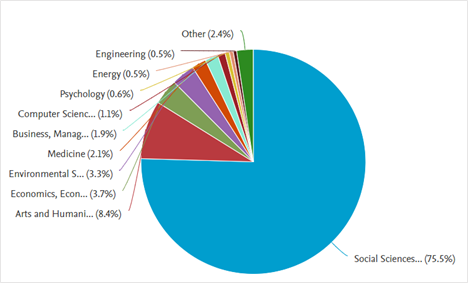Compliance action, administrative litigation and constitutional court
a systematic review
DOI:
https://doi.org/10.51252/rcri.v3i1.473Keywords:
administrative act, legal control, legal regulations, fundamental rightsAbstract
The purpose of this article is to systematically review the specialized literature on enforcement actions, administrative litigation and constitutional courts. For this purpose, in methodological terms, the PRISMA protocol has been used, as well as some bibliometric criteria, based on the metadata of the Scopus database of scientific publications, on the basis of some 1940 previously located texts. The results of the metadata review made it possible to prioritize 12 articles, whose authors were analyzed on the basis of the texts reviewed. Among the conclusions, it is estimated that there are several elements based on the experience of some countries in the region, on how they implement follow-up measures in different contexts, around the rule of law and administrative procedures, the functioning of justice, and the relations between citizens and the State in situations related to fundamental rights.
Downloads
References
Aragón Reyes, M. (2019). El futuro de la justicia constitucional. Anuario Iberoamericano de Justicia Constitucional, 23(1), 11–41. https://doi.org/10.18042/cepc/aijc.23.01
Constitución Política del Perú. (1993). Constitución Política del Perú. Presidencia de la República del Perú. Plataforma digital única del Estado Peruano. https://www.gob.pe/institucion/presidencia/informes-publicaciones/196158-constitucion-politica-del-peru
Cui, W., Cheng, J., & Wiesner, D. (2019). Judicial Review of Government Actions in China. China Perspectives, 2019(1), 35–44. https://doi.org/10.4000/chinaperspectives.8703
García Canales, M. (1989). Principios generales y principios constitucionales. Revista de Estudios Políticos, 64, 131–162. https://www.cepc.gob.es/publicaciones/revistas/revista-de-estudios-politicos/numero-64-abriljunio-1989/principios-generales-y-principios-constitucionales-1
Gonzalez Cedeño, H. (2019). Los límites a la interpretación del Tribunal Constitucional en el Perú [Universidad Nacional de Trujillo]. http://dspace.unitru.edu.pe/handle/UNITRU/12980
Gough, D., Thomas, J., & Oliver, S. (2012). Clarifying differences between review designs and methods. Systematic Reviews, 1(1), 28. https://doi.org/10.1186/2046-4053-1-28
Harris Moya, P. (2020). El antagonismo de la doctrina de la nulidad y de la responsabilidad administrativa: ¿mito o realidad? Revista de Derecho (Valdivia), 33(2), 189–204. https://doi.org/10.4067/S0718-09502020000200189
Harris Moya, P. (2022). El contencioso administrativo de multas sanitarias en el derecho chileno: ¿es compatible con el principio de proporcionalidad? Revista Derecho Del Estado, 53, 317–340. https://doi.org/10.18601/01229893.n53.11
Hong, D. U., & Lee, J. Y. (2018). Why Are There So Few Investor-State Arbitrations in China? A Comparison with Other East Asian Economies. China and WTO Review, 4(1), 35–65. https://doi.org/10.14330/cwr.2018.4.1.02
Jazuli, M. R., Idris, M. M., & Yaguma, P. (2022). The importance of institutional quality: Reviewing the relevance of Indonesia’s Omnibus Law on national competitiveness. Humanities and Social Sciences Communications, 9(1), 334. https://doi.org/10.1057/s41599-022-01343-w
Mora Bernal, A. E., Sánchez Sarmiento, M. P., Cajamarca Torres, A. E., & Idrovo Torres, D. F. (2022). El sistema automático de trámite judicial en Ecuador: ¿vulnera derechos fundamentales? Revista Chilena de Derecho y Tecnología, 11(1), 203–228. https://doi.org/10.5354/0719-2584.2022.61859
Okafor, O. N. (2023). Shaming of Tax Evaders: Empirical Evidence on Perceptions of Retributive Justice and Tax Compliance Intentions. Journal of Business Ethics, 182(2), 377–395. https://doi.org/10.1007/s10551-021-05011-y
Riofrío, J. C. (2020). Alcance y límites del principio de jerarquía. Criterios para jerarquizar derechos, valores, bienes y otros elementos. Derecho PUCP, 84, 189–222. https://doi.org/10.18800/derechopucp.202001.007
Rivero D’ Armas, I. (2022). Hacia una caracterización del género discursivo de la sentencia constitucional venezolana. Revista Latinoamericana de Estudios Del Discurso, 22(1), 161–181. https://doi.org/10.35956/v.22.n1.2022.p.161-181
Sana, G., & Guarido Filho, E. (2021). Mechanisms for risk elimination of a compliance trap in the Brazilian tele communications industry. RAM. Revista de Administração Mackenzie, 22(5). https://doi.org/10.1590/1678-6971/eramr210179
Santy Cabrera, L. (2019). El proceso de cumplimiento frente a la inactividad material de la administración. Gaceta Constitucional & Procesal Constitucional, 133, 131–138.
Soosay, C. A., & Hyland, P. (2015). A decade of supply chain collaboration and directions for future research. Supply Chain Management: An International Journal, 20(6), 613–630. https://doi.org/10.1108/SCM-06-2015-0217
Vargas-Chaves, I., Gómez-Rey, A., & Rodríguez, G. A. (2018). La invocabilidad de la acción de cumplimiento frente a los compromisos suscritos en el paro nacional agrario de 2013: un análisis desde la regulación de las semillas certificadas en Colombia. Jurídicas, 15(1), 28–45. https://doi.org/10.17151/jurid.2018.15.1.3
Wiesing, U. (2022). The Judgment of the German Federal Constitutional Court regarding assisted suicide: a template for pluralistic states? Journal of Medical Ethics, 48(8), 542–546. https://doi.org/10.1136/medethics-2021-107233
Zhu, J., Xu, Q., Pan, Y., Qiu, L., Peng, Y., & Bao, H. (2018). Land-Acquisition and Resettlement (LAR) Conflicts: A Perspective of Spatial Injustice of Urban Public Resources Allocation. Sustainability, 10(3), 884. https://doi.org/10.3390/su10030884

Published
How to Cite
Issue
Section
License
Copyright (c) 2023 Rubén Melitón Miraya-Gutiérrez

This work is licensed under a Creative Commons Attribution 4.0 International License.
The authors retain their rights:
a. The authors retain their trademark and patent rights, as well as any process or procedure described in the article.
b. The authors retain the right to share, copy, distribute, execute and publicly communicate the article published in the Ratio Iure Scientific Journal (RCRI) (for example, place it in an institutional repository or publish it in a book), with an acknowledgment of its initial publication in the RCRI.
c. Authors retain the right to make a subsequent publication of their work, to use the article or any part of it (for example: a compilation of their works, notes for conferences, thesis, or for a book), provided that they indicate the source of publication (authors of the work, journal, volume, number and date).






